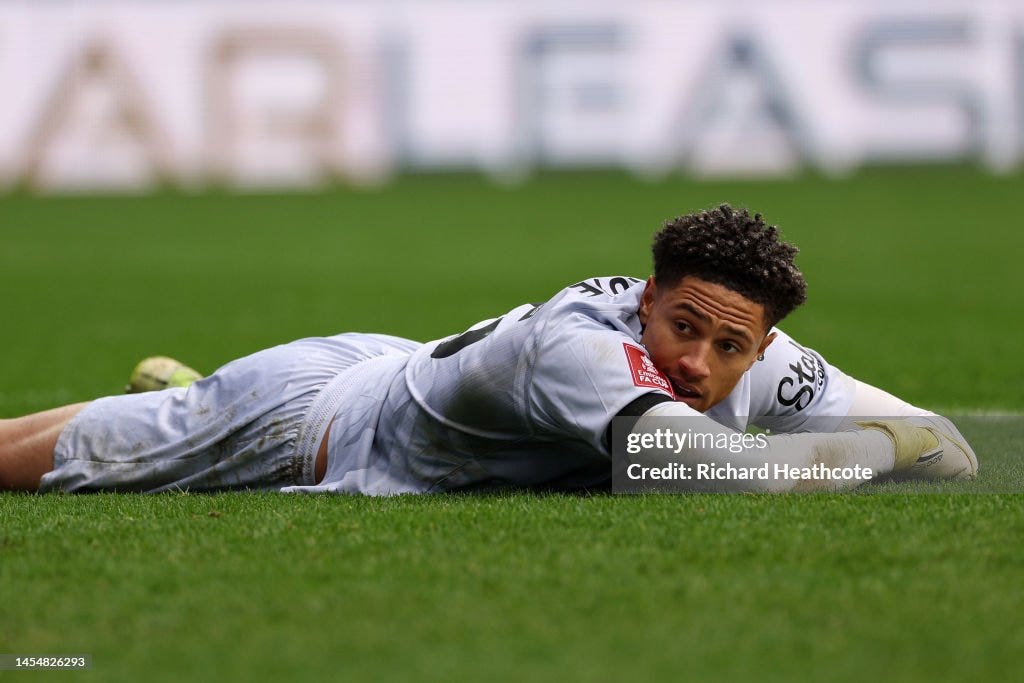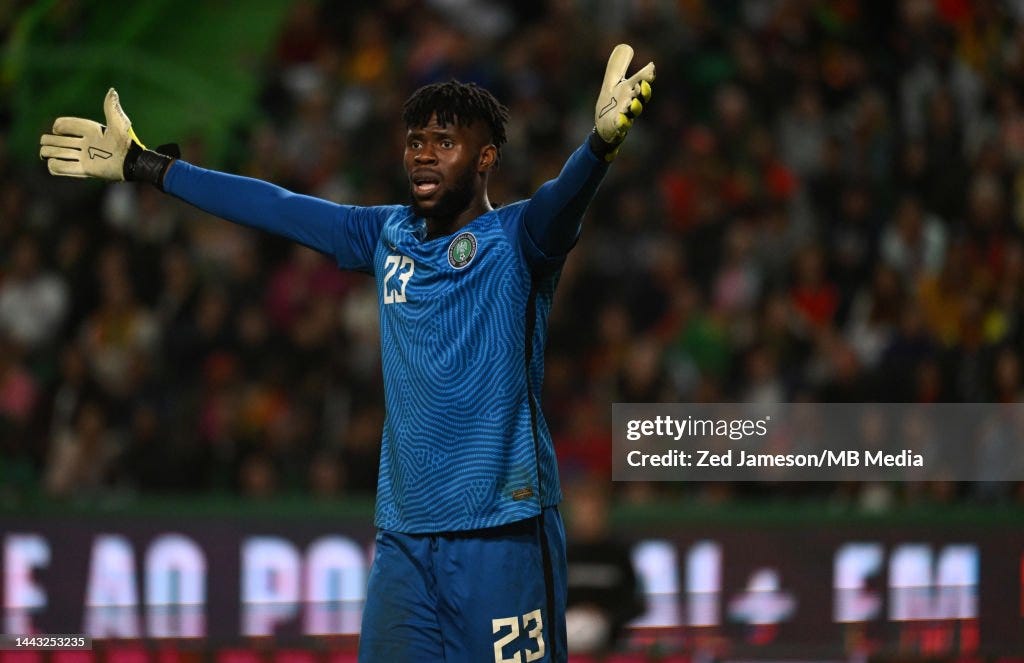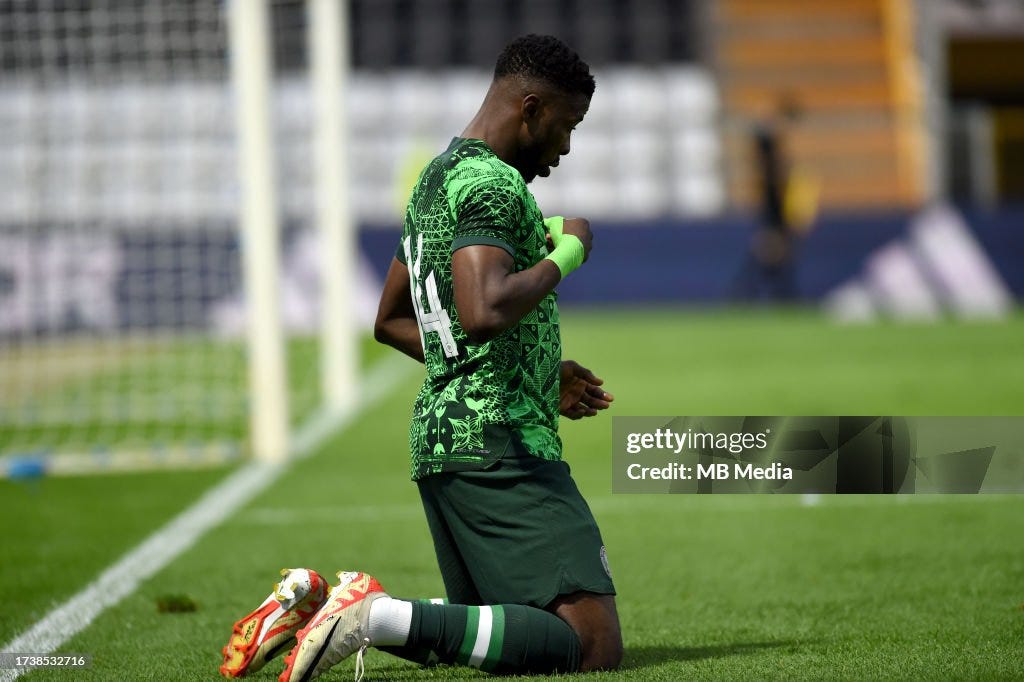Nigeria's number one problem
Francis Uzoho and Maduka Okoye, Nigeria's two frontrunners for the national team goalkeeper position, have played a combined zero games this season.

In this day and age, it’s unsurprising for the Nigerian national team to not have a major problem with the AFCON ready to gear up. Gernot Rohr’s shocking firing in 2021. John Obi Mikel’s strained knee in 2019. Chad’s financial withdrawal in 2017, forcing Egypt, Nigeria, and Tanzania to battle for just one qualifying spot (which Egypt eventually won). Nigeria’s biggest worry in 2023 could be its lack of a starting goalkeeper, which has been evident all year round.
Francis Uzoho, the current starting keeper for Nigeria, has not played a competitive game for his club Omonia Nicosia since May. His understudy, Maduka Okoye, has a slightly better situation. He played 120 minutes in a 2-1 extra-time loss in the Coppa Italia against Cagliari with Udinese. Most other contenders have a significant knock on them.
Swallows stopper Daniel Akpeyi (30) is too old and inconsistent to nail down a starting spot, while Chelmsford’s Joshua Oluwayemi (22) is too inexperienced and unproven to really make waves in Lagos. Hapoel Jerusalem’s Adebayo Adeleye will likely be out of action for a long time because of the conflict surrounding Israel and Palestine. Chippa United’s Stanley Nwabili has been getting steady playing time, playing 10 games and conceding eight goals, but may be unprepared for superior competition when it comes to AFCON.
Without a Victor Enyeama or a Peter Rufai in the net for Nigeria, the Super Eagles look shakier than ever. Unsettling defensive disaster classes against Saudi Arabia (2-2), Mozambique (3-2), Lesotho (1-1), and Zimbabwe (1-1) have forced Jose Peseiro and the NFF into an uncomfortable talk.
Who will be Nigeria’s goalkeeper?
Nigeria’s shaky keeper situation
Nigeria’s 2014 World Cup is arguably the last time Nigeria had a stable goalkeeper situation. After the legendary Enyeama retired from international football, leaving behind 101 caps, an AFCON, and a goalkeeping legacy untouched by his successors. A number of names rose through fighting for the starting spot, with Akpeyi, Carl Ikeme (Wolverhampton Wolves), and Ikechukwu Ezenwa (Sunshine Stars) all jostling for a spot.
Consecutive absences from AFCON in 2015 and 2017 forced a redirection. Ikeme and Ezenwa were all but dropped from the squad, only hanging on by the fringes. Akpeyi, who had some exciting glimmers but couldn’t shine over the older Ikeme and Ezenwa, and teenage Deportive La Coruna talent Uzoho took center stage.
Uzoho ended up beating Akpeyi, as then-manager Rohr saw it, and started in the 2018 World Cup. He put up a valiant effort, conceding two against Croatia and two against Argentina, and keeping a clean sheet for Nigeria’s sole win against Iceland. Akpeyi fell out of favor due to decreasing playing time and old age, but a new name came onto the scene. Sparta Rotterdam’s Maduka Okoye was not only getting playing time but also interest from scouts and putting up very good performances. Contrasted with Uzoho, whose career took a nosedive after leaving Spain for Greece (where he is a backup), Okoye was a no-brainer start.
However, with Okoye’s move to Watford and long-term benching, Uzoho has retaken the starting spot based on experience and reliability. There have been many bad stretches, like the daisy-cutter from Ghanaian midfielder Thomas Partey that squeaked from under him that cost Nigeria a 2022 World Cup bid, or his indecisive behavior when presented with a one-on-one chance with Troyes forward Mama Baldé, which led to a Guinea-Bissau goal and set-up an embarrassing 1-0 loss to Guinea-Bissau on home turf. The six conceded goals in four games are signals that Nigeria needs a solution, and quickly.
The Keeper Pool

As mentioned before, Omonia Nicosia’s Uzoho will be Nigeria’s first-choice keeper, having played in almost all of Nigeria’s high-profile games since the 2021 AFCON ended. In five games played, Uzoho has conceded twice - once to Sierra Leone and another to Guinea-Bissau, both away. He’s collected six saves along with three clean sheets. The numbers are enticing on paper, but the lack of competition isn’t doing much to cement his case as top dog.
When he and the Super Eagles took on Saudi Arabia in a friendly, Uzoho let in two goals, one of which was an egregious error where he turned a routine punch into an unfortunate deflection to give the Saudis an opener.
However, Uzoho is better than the other options. Okoye is generally the higher-rated keeper, plays against better competition, and also has a better track record for the national team. In the last AFCON, Okoye conceded just two goals in three appearances, completing four saves.
However, the then-Sparta Rotterdam stopper conceded a poor error in the team’s round of 16 loss to Tunisia where he let a daisy-cutter from Youssef Msakni bounce off his hand into the net. He lost the starting spot to Uzoho for the team’s World Cup qualifying loss to Ghana because of withdrawal from the team camp. A mix of a lack of game time, a weariness around him considering his prior mistake, and the generally good form of Uzoho kept Okoye out of the starting lineup for a solid year or so. He returned to the camp in Nigeria’s friendly loss to Portugal and their draw to Saudi Arabia.
Adeleye of Hapoel Jerusalem has seen some time with the national team, playing all 90 minutes of Nigeria’s 3-2 win over Sierra Leone to claim qualification to the 2023 AFCON. His constant playing time and malleability due to his age make him an exciting prospect to mold going into the future for Jose Peseiro.
However, Adeleye is best described as a “raw talent”. In the five games he’s played for bottom-table Hapoel Jerusalem, Adeleye has conceded nine goals and failed to keep a clean sheet. He’s a spotty passer and not a reliable option to play the ball back to when the pressing gets tough, and his shot-stopping is mediocre, to say the least. It’s safe to say Peseiro and co. view Adeyele as a last resort, rather than an exciting young player to unleash going into January.
Uzoho, Okoye, and Adeleye form the top three going into AFCON. There are outside picks that could sneak into the practice squad and make a good impression. Joshua Oluwayemi is an exciting prospect dominating the National League South (sixth-tier of England football) with Chelmsford on loan from Portsmouth, conceding 14 goals in 15 games while keeping nine clean sheets. However, he’s nowhere near ready for continental competition, and he's best left as a player to watch for. The same is true with Chijoke Aniagboso (FK Polissya Zhytomyr), a prodigy who shone with Nigeria U20s. There are also veteran options in Akpeyi, John Noble (shortlisted by ex-gaffer Austin Eguavoen in 2021), and Ezenwa. Olorunleke Ojo, who was called up for Nigeria’s World Cup qualifiers on Thursday and Sunday, is an outside pick, but his inclusion looks like little more than to please supporters of the NPFL.
Can They Work Past It?

One of Nigeria’s main weaknesses going into this tournament is that they don’t have an Onana or a Mendy or a Bounou they can rely on defensively, especially with Nigeria’s shaky defensive line. They showed their fragility in draws to both Lesotho and Zimbabwe, two African minnows ranked outside FIFA’s top 120 teams. In both games, poor defense and lapses in concentration forced Nigeria to settle for just one point.
In a group of six where the top team automatically makes it to the 2026 World Cup qualifiers, the second team advances to the playoffs, and the rest are eliminated, Nigeria is third. If their current form continues, Nigeria could miss out on the World Cup for the second straight time.
Many African teams don’t have a dependable keeper. Ghana’s Richard Ofori has played just three gsmes for Orlando Pirates this season, but due to a lack of quality, he got the start for Ghana’s two games against Madagascar and Comoros. His weaknesses were largely masked by the excellence of the defense, with players like Daniel Amartey (who has found his form with Besiktas) and Alidu Seidu (Clermont Foot) helping him through he process. Although Ghana did lose 1-0 to Comoros, Ofori was largely solid throughout the international break.
Nigeria not only needs a solid keeper, but an even better defensive line. Fulham’s Calvin Bassey and Forest’s Ola Aina are both in good form in the Premier League, while Bright Osayi-Samuel (Fenerbahçe) is also performing decently. However, their excellence surprisingly hasn’t translated against weaker, less skilled opponents. The relative inexperience of Sopuruchukwu Onyemaechi (Boavista) and Jamilu Collins (Cardiff) has strained Nigeria’s options.
Nigeria can fix their keeper woes if they schedule a pre-AFCON friendly before their opener against Equatorial Guinea on January 14. Although they’re the favorites to advance out of the group stages, teams like the Equatorial Guinea, hosts Ivory Coast, and Guinea-Bissau (who they’ve had notoriously struggled against) could give them a tough time.
Uzoho is still manager Jose Peseiro’s favored keeper, but looks like he’s struggling amidst the mental pressures that come with being a national team’s starting keeper. Nigerian outlets report Uzoho is considering quitting the national team, and he has deactivated his socials after a massive outpouring of hate from Nigerian fans. He could see more playing time after Omonia first-choice keeper Fabiano suffered an injury in the final game before the international break.

